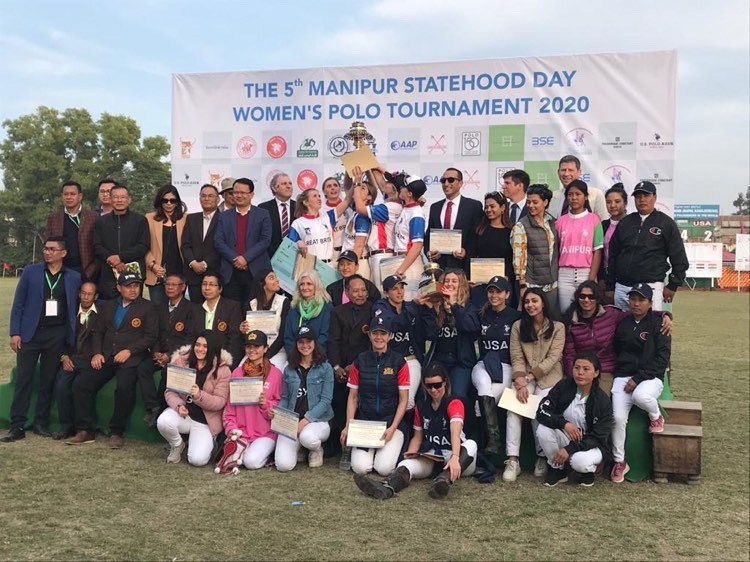My passion for polo has taken me all over the world. Winston Churchill’s famous saying, “A polo handicap is a passport to the world,” has certainly held true for me. I have played in the US, Mexico, Argentina, China, Guatemala, Canada, and most recently at the 5th Manipur Statehood Day Women’s Polo Tournament in Imphal, Manipur at the northeastern edge of India.

I must say my experience in Manipur was certainly unique. Like most international tournaments we were able to meet incredible polo women from around the world. The respective polo federations sent teams representing Argentina, the United Kingdom, Egypt, Indian Polo Association from New Delhi (and a local Manipur team). All teams traveled to Imphal for this first and only women’s polo tournament in India. Here, I had the amazing experience of playing on what is arguably, the descendants of the first polo ponies, the Manipuri Pony.
The Manipuri Ponies we played on in India were certainly different [to polo ponies elsewhere]. These small to medium-sized ponies are all about 12 hands or smaller [polo ponies are usually about 15 hands]. Every player used mallets between 45”- 47” [normally 51″-53″]. Despite their size, these ponies were tough.

At the end of the tournament, a prize was given to the best playing pony, and to the naughtiest pony. I was fortunate to have played on Thok-thak (“rascal” in Manipuri) the naughtiest pony, and I will say, it was a well-deserved award for this fiery chestnut pony. The ponies are not exactly the fine-tuned polo ponies you find in other parts of the world, but they are not “naughty” in the traditional sense either. They may not stop quickly, or turn willingly, but they try hard. Never once did a pony kick, buck, rear, or try to throw their rider. Some may have been better trained than others, but they were all well-behaved on and off the field.

The polo stadium at Mapal Kangjeibung is magnificent. Located in the center of the city, the stadium has beautifully built rows of comfortable seats on one side, and a speaker system fueled with lively commentary. On the other side of the field sat stables where the horses were kept for the duration of the tournament.

The field was not regulation size, but it still seemed large enough to play a fun, open game. Since the ponies are smaller, they don’t cover nearly as much ground as a thoroughbred might when they are running flat out, so the smaller size field did not seem to make much of a difference in terms of play. Further, the field was flat, and well maintained, but a bit hard, so the ball traveled quite far when a player really connected. This allowed the games to open up, which made faster, more exciting matches.

To keep the tournament fair each match was four chukkers played on a split string format. The string of ponies that were provided to team A for the first half of the match were then provided to team B for the second half of the match, and vice versa. Thus, every pony played two total chukkers with a rest period in between. Most horses would not have had the stamina to play two outdoor chukkers, but these ponies, even in the second half seemed to have plenty of spirit. I was amazed at their willingness, and endurance.

I was honored to be chosen as one of the players to represent the United States. I was excited to not only represent the US, but also my sponsor Hawaii Polo Life, an organization that has always been at the forefront of promoting meaningful bonds in the world of polo. I was able to get to know polo women from around the world and to bond with the other US women selected for Team USA.
Building these relationships is an important facet of women’s polo. The Women’s International Polo Network (WIPN) was established to help promote meaningful experiences like these. So, traveling with new women from various parts of the world, also helped me bring awareness and participation to the WIPN.

Team USA consisted of myself, Athena Malin, Alyson Poor, Bridget Sibson, and Carolyn Stimmel. Ed Armstrong was our coach, mentor, and one of the main founders of this tournament. Several organizations came together to make this tournament possible. Produced by Polo Yatra, the women’s polo initiative of Huntre! Equine, the tournament was organized by the All Manipur Polo Association, and Manipur Tourism as the presenting sponsor played host. Incredible India of the Ministry of Tourism sponsored our international travel, while the US Polo Assn. provided the teams with customized jerseys and outfitted the grooms as well. Local players lent their ponies, and participating teams provided umpires and coaching help when needed.
The group effort facilitated a fantastic turnout in the thousands.
Our first game was against Egypt, a new team with an impressive debut. Sadly, our teammate had an accident which landed her in the hospital, (she is ok now), so we swapped in our substitute (who arrived only 1 hour before the match!) to finish the game.

A well-played game, & despite the accident, we were fortunate to come out on top (8-1). Our next opponent was the local Manipur women’s team. Wow, these women were tough! The Manipuri women are fearless, determined women with a unique style of play. They put on a spectacular match, we were lucky to come out with a win (7-1).
The two wins earned us a spot in the finals where we faced the UK ladies’ team. With a 15-goal ladies USA team against an 18-goal ladies UK team we knew we were in for a challenging match. Challenging indeed, we came out with a tough loss (2-5). Despite the loss, spirits were high. We were all given an incredible opportunity to immerse ourselves in a different culture and experience a magnificent equine athlete – the Manipuri Pony.

*Pamela Flanagan is a polo player with a 4-goal women’s handicap. She is an attorney, a member of the USPA Women’s Handicap Committee, representative of Hawaii Polo Life, a co-founder of the Women’s International Polo Network, and a passionate advocate for rescue horses. In 2019 Pamela won the Women’s US Open and was awarded the Clint Nagle Equine Welfare Award. She played on the US team at the 5th Manipur Statehood Day Women’s Polo Tournament held in Imphal from January 17-21, 2020.



